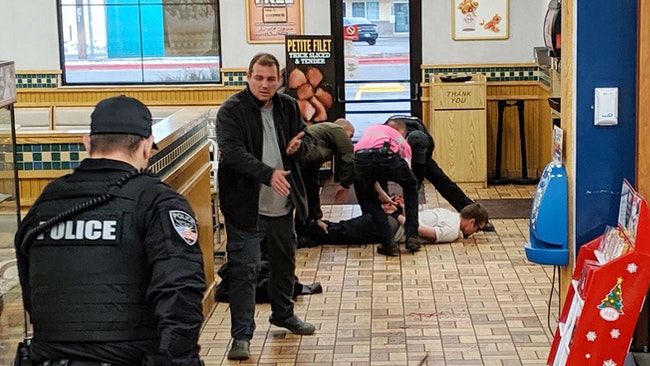
Employees of Pilot Travel Center in Ontario restrain a suspect after a stabbing on Saturday, Dec. 21 that hospitalized Ronnell T. Hughes. (Frank LeCalir/special to the Enterprise)
Let’s be very clear about the terrible knife attack days before Christmas in Ontario. This does not represent Ontario or any part of Malheur County. Almost as one, the community reacted in shock and shame at what happened to a black man showing up for work.
The shock was that a slashing attack like this could happen in our community. Ronnell T. Hughes, 48, was ready to start a new job in Ontario after moving to town in October when struck. The shame is that police said the attack on Hughes, who is black, seemed to be motivated by race, a detail that rapidly spread across the country via news reports.
The community’s better nature quickly emerged. The people of Ontario, indeed of Malheur County, wanted it known that the attack in no way reflected what they believe. This was not the result of local racism, but rather a demented act now charged to a trucker who just happened to pull off the freeway in Ontario.
Ontario and Malheur County are diverse, as it has been through much of time. Latinos and Japanese are cornerstones in the community. A small refugee community remains a vibrant element of Ontario, welcomed and supported by many.
As for Hughes, he quickly felt the community’s love. Angie Grove of Mackey’s restaurant gave voice to that, offering a fundraising dinner to help Hughes. When word got out of her intentions, the community rallied, pledging donations for an auction and promising to show up for the New Year’s Eve dinner that would be about rejecting racism and showering Hughes with the civil attention that any resident, regardless of race, deserves.
There was one sour note in the community reaction. Keyboard warriors questioned whether this was really a racial attack. They didn’t do so out of honest curiosity, but instead sought to sow doubt and fan ugliness. A couple of them wondered why Oregon needed to make it a special crime to show bias. Simple: A person’s individuality should not, cannot, be tolerated as a provocation for attack. The law covers race but also color, religion, gender identity, sexual orientation, disability or national origin.
As do many, we hope Hughes recovers fully from his wounds, and that he still considers Ontario a place he wants to call home.
But there is more the rest of us can do. For one, each of us has a duty to defend the Ronnell Hugheses of the world – to speak out against ignorance, hate and bigotry. Silence is acquiescence. Looking the other way is cowardly. If you see someone being abused, whether physically or otherwise, because of who they are, you speak up. If the circumstances are risky, don’t hesitate to call 911.
And perhaps there is room for more education in our community. The crime of bias is new, and likely it’s not well understood. Local organizations, particularly those that stand strong for human rights, might consider a public forum to address the law and its intentions.
However, none of us should need a community forum to tell us the right way to treat another human being in our community. Do what’s right and fair. Do what’s just. Show the world that in Ontario, hate is a stranger and a mighty unwelcome one. – LZ




